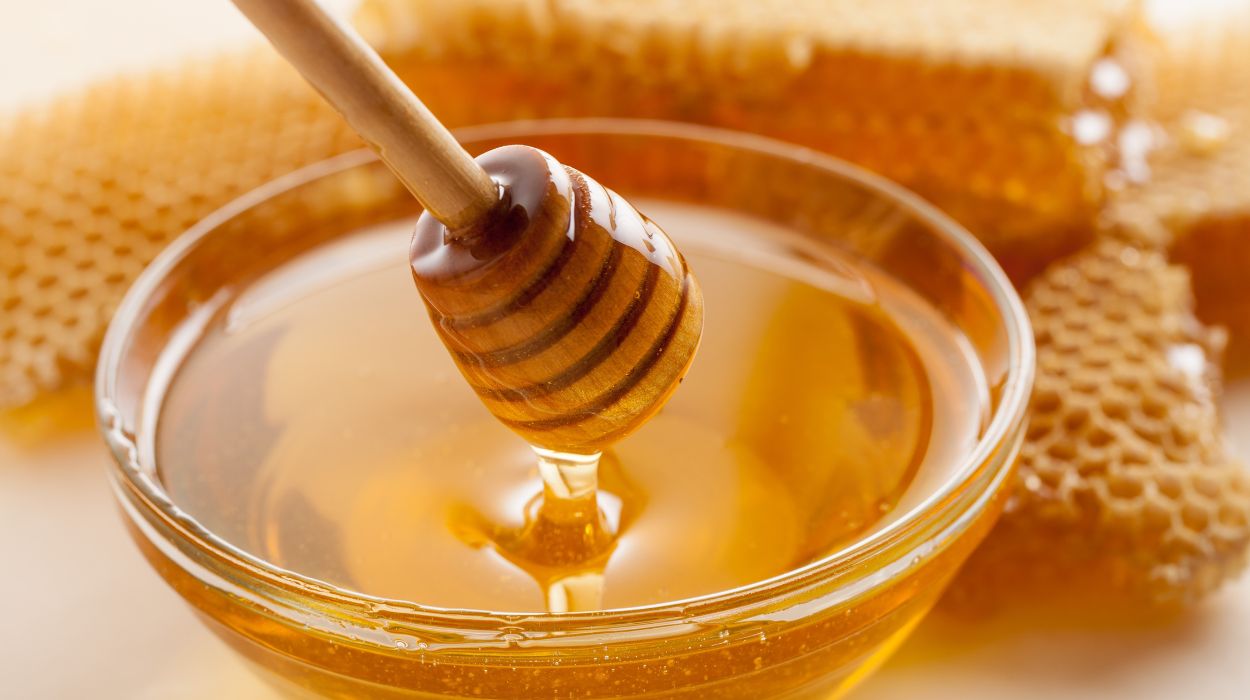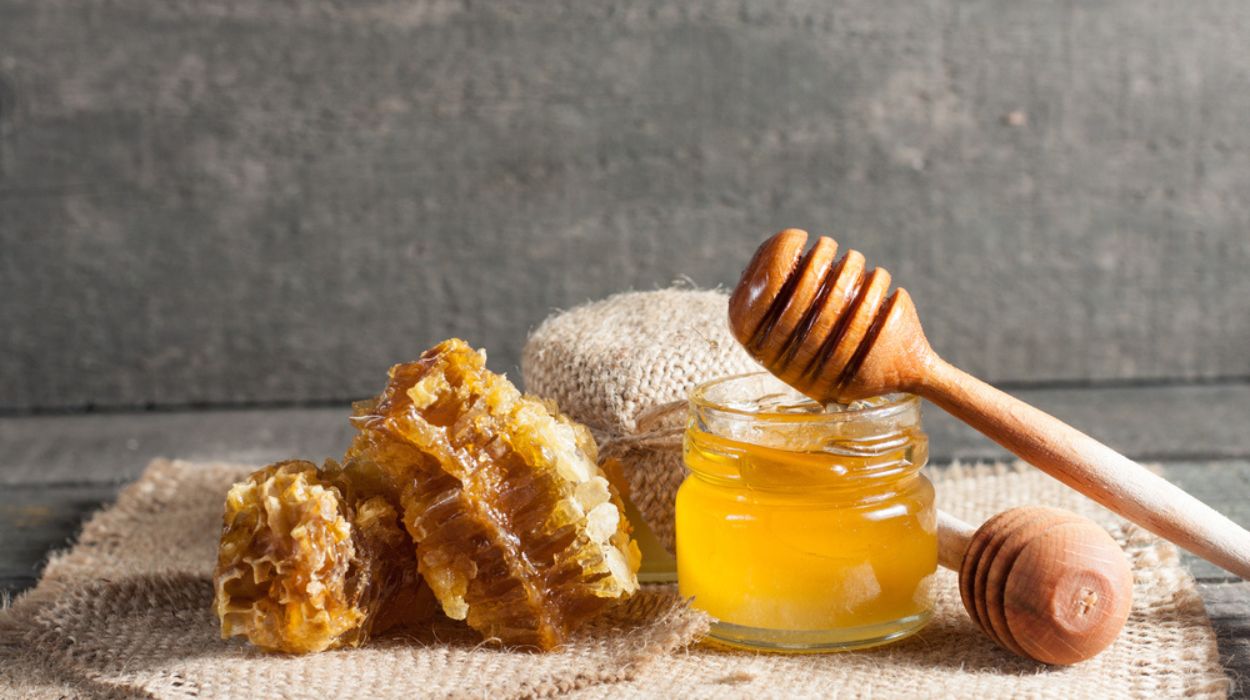A popular addition to desserts and hot beverages, honey is a syrupy liquid from plant nectar. Honey carries an indefinite shelf life, making it a great staple in every pantry cupboard. The product has many potential health benefits and is a base for several therapeutic herbal remedies, including those for weight loss.
This golden superfood is fat-free, which makes it a useful replacement for sugar in weight-loss diets. Explore below to learn more about using honey for weight loss.
Is Honey Good For Weight Loss?
Yes, honey can be a beneficial addition to a weight loss journey. Packed with antioxidants, it offers a natural sweetness that can satisfy cravings, potentially reducing the desire for refined sugars. Honey’s unique blend of fructose and glucose can also provide a steady energy release, supporting an active lifestyle. Including honey in a balanced diet might enhance flavor variety, making healthier food options more enjoyable.
Is Honey Good For Weight Loss?

Honey has a beneficial nutritional profile, including trace amounts of vitamins, minerals, and antioxidants. While this composition contributes to several health benefits, the question remains: Is honey good for weight loss?
The answer is yes, and here’s what science says.
Although honey is quite sweet and is typically discouraged on weight loss diets, the sugars in honey can benefit weight loss. Honey contains fructose and glucose,[1] natural sugars that boost energy.
This satiating effect may support portion control and overall calorie management. A study[2] reported that honey protects individuals against conditions like metabolic syndrome and diseases associated with oxidative stress-related[3] disorders like obesity. Obesity is a state of low-grade inflammation that induces oxidative stress in the body.
Research also shows that honey reduces inflammation, blood sugar, blood lipids,[4] and stress,[5] which can play a crucial role in supporting weight loss. Honey’s versatility allows it to be easily incorporated into various recipes, providing a sweet flavor without relying on heavily processed sweeteners.
This versatility supports a diverse and enjoyable diet, which helps with long-term adherence to a healthy eating pattern. Despite this, we must recognize honey’s calorie count. With a tablespoon of honey being 64 calories,[6] honey is not a low-calorie food. Excessive consumption can lead to an increased calorie intake, and you may gain weight.
More Benefits Of Honey
Aside from losing weight or helping you get rid of excess body fat, honey also provides the body with several other benefits. Evidence[7] indicates honey produces different effects, which can help other aspects of health in the following ways:
Antidiabetic And Anti-Inflammatory
Honey regulates blood sugar levels[8] by managing insulin sensitivity. This reduces the risk of diabetes-related complications[9] and improves overall health. In addition, polyphenols, an active component in honey, can help combat inflammation.[10] This helps prevent, manage, and reduce the risk of chronic inflammatory diseases.
Antioxidant And Antibacterial
The antioxidant properties[11] of honey shield cells from damage caused by free radicals. This reduces oxidative stress[12] and lowers the risk of chronic diseases. These effects also protect the nervous system, reducing the risk of neurodegenerative diseases.[13] Honey is an antimicrobial agent that can fight harmful bacteria,[14] supporting the immune system.
Respiratory
Honey supports lung function and respiratory health.[15] It has been identified as a superior option for relieving symptoms of upper respiratory tract infections compared to conventional choices.
Cardiovascular
Honey promotes heart health[16] by controlling oxidation, lowering blood pressure, restoring heartbeats, and minimizing damage after a heart attack. Furthermore, it improves how the body handles fats, reducing the risk of cardiovascular diseases, heart attacks, and strokes.
Gastrointestinal
Honey can reduce the presence of infection-causing bacteria[17] in the gut while promoting the growth of beneficial bacteria. This dual action supports gut health, helps prevent digestive issues, and enhances nutrient absorption.
The Nutritional Value Of Honey
As mentioned earlier, honey is rich in vitamins, minerals, and nutrients, which can support better health and weight loss. A 20-gram serving of honey[6] (1 tablespoon) is 60.8 calories and contains:
- Fat: 0 grams.
- Fiber: 0 mg.
- Calcium: 1.2 mg.
- Selenium: 0.1 µg.
- Magnesium: 0.4 mg.
- Potassium: 10.4 mg.
- Vitamin C: 0.1 mg.
- Protein: 0 grams.
- Carbs: 16.5 grams.
Research[18] indicates that honey, with its low-fat and high-nutrient content, holds significant value as a nutraceutical agent akin to a weight loss supplement. The presence of antioxidants like vitamin C and selenium, as seen above, plays a pivotal role in aiding weight loss.
According to a study,[19] oxidative stress is one of the leading causes of obesity. When our cells experience oxidative stress, it can lead to inflammation and damage, contributing to weight-related issues.
Here’s where a nutraceutical like honey steps in to lend a helping hand. Honey, with its natural antioxidants and anti-inflammatory[10] effects, neutralizes harmful free radicals that negatively affect cells.
By doing so, honey helps create a more balanced environment in the body, eliminating factors that allow weight gain or contribute to obesity. On the other hand, the anti-inflammatory effects decrease inflammation in the body, which affects the body’s ability to regulate weight.
Which Type Of Honey Is Good For Weight Loss?
There are many types of honey on the market, ranging from light to dark and syrupy, each with a unique taste and set of benefits. So, which type of honey is good for weight loss? Let’s look at them below:
- Wild Honey.
- Gelam Honey.[20]
- Manuka Honey.[21]
- Raw Organic Honey.
These types of honey enhance insulin sensitivity and have protective antioxidative effects, which can help eliminate visceral belly fat.[22] For instance, Gelam honey has demonstrated its ability to prevent weight gain in animal models subjected to a high-fat diet.
The animals fed gelam had reduced fat cell size, along with lower levels of blood glucose, cholesterol, and triglycerides. Pairing one of the kinds of honey mentioned above with a fat-burning supplement and other foods known to promote weight loss could also accelerate weight loss efforts and improve overall metabolism.
This extends to beverages as well. An ideal weight-loss beverage is green tea mixed with a little honey. Green tea is known for its fat-burning properties, so drinking it spiked with honey may be the best way to drink honey-infused beverages.
Other Tips To Know
Moderation Is Key
Regarding weight loss, we need to know how much of a calorie deficit is needed to lose weight. Since honey is high in calories, you must be cautious of how much you consume daily. There isn’t a set serving of honey for weight loss. However, research suggests a daily tablespoon or two.
Balanced Diet And Substitution
Incorporate honey into a nutrient-rich diet that includes fresh fruits, vegetables, lean proteins, healthy fats, and whole grains. Avoid a high-fat diet or foods that contain empty calories. You can also use honey as a substitute for sugar in your diet, but you will not save on calories.
Sugar has fewer calories at 48 a tablespoon.[23]
Stay Hydrated
Water and weight loss work hand in hand, but people often wonder, how much water should I drink to lose weight? According to a study,[24] drinking 500 ml of water before meals, in addition to regular water intake, increased metabolic rates by 30%.
It also increases energy expenditure,[25] which is essential to weight loss programs. You can also opt for drinking honey-infused water. Mix honey with warm water and lemon juice or cinnamon powder for an infused weight-loss drink.
Conclusion
Despite its high-calorie content and sweet taste, honey provides health benefits[26] and may positively influence weight loss. It is also helpful in cardiovascular, gastrointestinal, inflammatory, and carcinogenic disease states.
It supports weight loss by enhancing insulin sensitivity and promoting efficient glucose metabolism. This helps regulate sugar levels,[27] reducing the likelihood of fat accumulation or weight gain.
Honey’s natural sweetness can also satisfy cravings, potentially curbing the intake of high-calorie foods or processed sugars. It can be used as a substitute for sugar or incorporated into a balanced diet to help with weight loss. So, if you are looking for the perfect solution to satisfying your sweet tooth while still losing excess weight, using small portions of honey may be your answer.
Frequently Asked Questions
Yes, it can, but is it clinically relevant? Probably not. Studies[2] mention honey enhances insulin sensitivity, allowing sugar to be processed more effectively. This stops excess sugar from being stored as fat and may support visceral belly fat loss over time.
Yes, it is. Incorporating honey into your diet in moderation or using it as a substitute for sugar or sugary foods and drinks can support weight loss.
Yes, it is. A daily spoonful of honey can offer health benefits and support weight loss due to its nutrient content and ability to regulate sugar levels and satisfy cravings. Honey also has antioxidants[11] that can help improve metabolism.
Yes, it is. You can consume honey daily for nutritional and health benefits or use honey for weight loss.
 Evidence Based
Evidence Based

